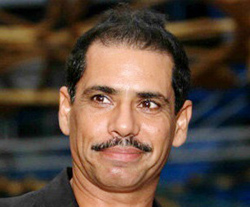Chandigarh, Oct 6: Haryana government has cleared a land deal between Robert Vadra, son-in-law of Congress chief Sonia Gandhi, and real estate giant DLF in Haryana as the issue spiced up the state assembly poll campaign with the Prime Minister and the Chief Minister crossing swords over it.
In a letter to the Haryana Chief Secretary and the Financial Commissioner (Revenue) in July this year, Gurgaon Deputy Commissioner Shekhar Vidyarthi had informed the government that the land mutation stood "valid" as per the report of the Assistant Consolidation Officer (ACO) of the district.
Whistleblower IAS Officer Ashok Khemka, who was the then Director General, Consolidation, had cancelled the mutation of the land between M/s Skylight Hospitality owned by Vadra and DLF Universal Limited in 2012.
In his report, the ACO termed Khemka's orders as "illegal, void and out of jurisdiction."
According to official sources, the letter by the Gurgaon Deputy Commissioner states "a mutation no 4513 for Khasra no. 730 measuring 5 bighas and 13 biswas was sanctioned by ACO on September 20, 2012, while exercising the powers of Assistant Collector second grade. Because of the mutation’s sanction, neither of the parties have any objection till date."
"Thus, mutation no 4513 stands approved by the ACO while exercising powers of Assistant Collector second grade, because M/s Skylight Hospitality Private Limited had conveyed right measurements to M/s DLF Universal Limited. Presently, according to revenue records, M/s DLF Universal Limited stands owner of the land," states the letter.
Raising the issue at an election meeting at Hisar, Prime Minister Narendra Modi asked the Election Commission to take serious note of Haryana government clearing the land deal between Vadra and DLF, alleging it was done hastily as Congress faced "certain defeat" in October 15 assembly polls.
"They (Hooda government) know that after the elections, the son-in-law (Vadra) will not get any clearance for illegal deals. So, in between the election process, they have dared to take such a decision," Modi said.
Chief Minister Bhupinder Singh Hooda said no wrong had been done in any land deal. "I am ready to quit if any wrong doing in any land deal is proved," he said.
Hooda said those making such allegations can approach the Lokayukta to probe the matter.





Comments
Add new comment